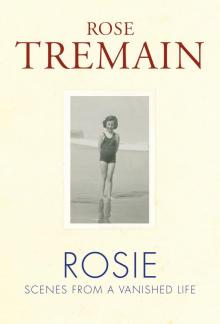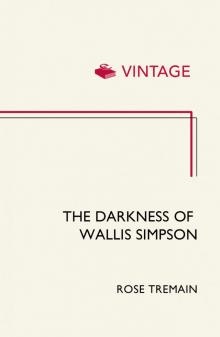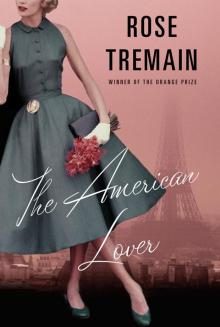- Home
- Rose Tremain
Sadler's Birthday Page 14
Sadler's Birthday Read online
Page 14
‘Oh, my hat. Yes, would you? I look a fright in that don’t I, but it does keep the sun out of my eyes. Now Sadler, tell me, what am I going to say?’
‘Well, if I was you, Madam, I’d wait and see. There’s two sides to most things, isn’t there?’
To Madge’s not particularly discerning eye there was only one side to Mrs Trent: she was a whore. Madge used the term loosely, of course, she didn’t literally mean that the woman was ‘on the streets’ or wherever it was that these kind of people paraded themselves. What she meant really was that Mrs Trent was ‘that type’. It seemed to be written not only over her face, but over each curve of her body, each tiny movement of her limbs.
She was standing by the drawing room mantelpiece, looking at the ornaments that stood on it. Her ‘friend’, hands in pockets, nudged her as Madge came in. Sadler, who had opened the door for Madge, heard her say nervously: ‘Good morning, I’m Mrs Bassett.’ He waited, listening, but this one remark seemed to be followed by silence.
Sadler went straight up to Tom. There was bright sunlight in his room coming through the thin, flowered curtain, but Tom still slept. Sadler sat down on a corner of the bed and looked at him. Tom was sixteen. His hair had grown darker. His body was still thin, but now it was strong. Sadler knew every part of it. He had kissed and caressed it, held it and penetrated it, believing that his love shaped its growing, that Tom needed him as much as he, released from what now seemed like years and years of death by this passion, needed the boy.
‘Tom,’ he whispered, ‘my love.’
Tom turned over. He shielded his eyes from the sunlight with a hand and looked at Sadler.
‘Did you bring some tea?’ he asked.
Sadler shook his head.
‘Why ’you staring at me, Jack?’
‘Because I love you.’
‘What’s the matter though? You look all miserable.’
‘Yes.’
‘What’ ser matter, Jack?’
Sadler walked to the window, drew the curtains and looked down at the orchard.
‘Your Ma’s here,’ he said without turning.
‘Go on!’ Tom sat up and swung his legs out of bed.
‘She is. She is here.’
‘How d’you know it’s my Ma?’
‘She told me.’
Tom thought a moment, then laughed. ‘She wouldn’t come!’
‘She has come, Tom. She’s got a man with her. He drove her down in his sports car.’
‘What man?’
‘I don’t know. I think he said his name was Harrison.’
‘It’s no one she knew.’
Sadler turned. ‘Well it doesn’t matter, does it, Tom? The things that’s …’
‘You’re always saying things don’t matter.’
‘I’m not, Tom, I was going to say what matters is …’
‘Bleedin’ Harrison. Could be anyone.’
‘The man’s not important.’
‘Sez you, Jack. He is to me. It’s my Ma!’
‘Well, you’ll soon discover who he is, won’t you?’
‘Yeah. But I don’t like ’er turnin’ up with just anyone. She’s not like that, my Ma. She’d never go with just anyone.’
Sadler began to feel a rage inside him that distilled pain through his chest and arms and made him want to grab Tom and shake him and shake him till the boy howled. He knew that he had to control it because if there was to be a parting it had to be gentle. Anger could have no place in a parting between him and Tom. He turned back to stare at the orchard, remembering how Annie had sometimes calmed herself by gazing, gazing without blinking at the trees outside her window. But the orchard couldn’t help him now. Each moment was precious and yet his senses were being dulled by his anger. Never before could he remember wanting to hurt Tom.
‘Tom—’
Sadler turned round but the boy wasn’t there. Gone, of course. Eager to see his Ma, and why not? He loved her, still can love her. Sadler thought how Tom used to talk about her, slip her name in whenever he could. Then when she didn’t write he never said anything, only stopped talking about her. Miserably, Sadler stared down at the apple trees. ‘I never saw that in London,’ Tom had once said of the orchard, ‘trees are just green there, not all pink and stuff.’
Madge in the drawing room was feeling very hot after her walk in the sun. Her guests, after the first five minutes of shy silence, during which Madge made little sallies into brittle conversation, were now being very talkative. Scarcely listening to them, Madge was only conscious of the wet patches in her blouse under her arms and of her irritation that Geoffrey should have left her to endure this ordeal alone. ‘I’m not good with people,’ she’d once admitted to Sadler, ‘I know I’m not. Some people of my — I mean, you know, like me, are terribly good at talking to everyone they meet. They can talk to people at bus stops, you know, or in the butchers. But I don’t know why, I just can’t get my right voice on. I seem to sound so stilted and awful …’ She knew that when she did manage to say what she wanted to say now, her voice would make these people despise her. She wondered that she should mind, wondered why she should care at all, when she in her turn found them despicable. Their talk, this rambling perjury, it filled her with disgust. And the man Harrison, so smarmy, so cocksure; Madge didn’t believe a word he said.
‘Let me put it this way, Mrs Bassett. Let me put it another way. To be quite honest with you, we’re not trying to make excuses. Dol – Mrs Trent isn’t just rolling up like to claim ’er son without offering you something by way of an explanation. I mean ter say, it isn’t as if we don’t recognize that it must ’ave cost you a bit ter keep the kid. I said to ’er, we’re going prepared to offer some remuneration. That’s only right. I mean, she knows it’s a long time, don’t you, Dol?’
‘Yes.’
‘It is a long time. But that’s been ’ard times an’ all. Difficult for everyone, mind. I wouldn’t deny that. But Dol’s ’ad no ’ome, see? She was bombed. One of the first bombs ter hit London hit Dol’s ’ouse. Sliced away ’alf her street. And if it ’adn’t of been for friends she’d’ve been out in the gutter. Nowhere to go. All her things gone. So you see, she ’ad no home ter offer the kid, did she?’
Harrison stopped. Madge saw the two faces looking at her and thought wearily that the moment had probably come to say her piece.
‘Whatever the reason,’ she began, realizing as she spoke that she hadn’t been listening properly, hadn’t heard the reason, ‘whatever the reason, I think it’s pretty disgraceful that you can care so little for a child that you can leave him in a stranger’s house for five years. Five years! Tom isn’t a child any more. You deserted him, failed to provide a home for him during his most formative years.’
‘But like I said, Mrs Bassett …’ Harrison began.
‘Don’t interrupt me please,’ said Madge, ‘I owe it to Tom to say this to you. I think it’s … I can’t express what I think. All I can say is that you are lucky my husband isn’t here because this whole business has made us both very angry indeed and ashamed, ashamed for Tom that you could so take advantage of the war to neglect your duty as a mother.’
‘You didn’t hear what he said, did you?’ This from Mrs Trent.
‘What do you mean?’
‘He told you why I couldn’t provide no ’ome for Tom. I didn’t have no bleedin’ home!’
‘Why not?’
‘Told yer she didn’t listen. ’Cos it was bombed, love. Big bang crash – no more house!’ Then piteously, ‘I lost everything, see? Even lost me old cat.’
The sweat in Madge’s armpits was ice cold. It was making her shiver. Such extremes of hot and cold, she thought, can’t be good for my metabolism.
‘I’m sorry,’ she said. ‘I’m sorry to hear that.’
‘Well it was terrible, Mrs Bassett. If I were to tell you …’
‘Yes, well I suppose you’d like to see Tom now, would you?’
‘How is my Tommy?’
�
�Oh he’s fine. He’s been very happy here with us, after the first shock of moving. He’s become very used to the kind of freedom he has here.’
‘Growed up, is he?’
‘Yes he is.’
‘Well,’ with a wink at Harrison, ‘it’ll be nice ter have another man about the house, won’t it, Mick?’
Madge longed for them to go. She was feeling so weak that, quite empty of words, she walked as quickly as she could to the door and rang the bell for Sadler.
Vera heard Madge’s buzz. She’d just sat down at the kitchen table to drink a cup of tea and have a glance at the Daily Sketch. Cursing, she got up to go and look for Sadler. It was going to be another of her bad days. Her ankles were playing her up, the Colonel had gone off to London just when she’d made him his favourite steak and kidney for lunch, and now Sadler wasn’t down for his tea and Madam was buzzing for him. Wearily, she climbed the back stairs and began calling.
‘Mr Sadler! Mr Sadler!’
Tom appeared on the landing above her, stuffing a clean white shirt into his trousers.
‘Is she there, Vera?’ he asked.
‘What, duck?’
‘Is she there? My Ma’s come. Didn’t you know?’
‘No one told me, love. All I know is Madam’s ringing for Mr Sadler.’
‘No she’s not. It’s for me. She wants me to go down and see my Ma. Tell her I’m coming, Vera. Just got to get my shoes …’
He ran to the airing cupboard where his shoes, damp from a river outing, had been put to dry. Vera, out of breath as always when she climbed stairs, stood where she was. She couldn’t bear any kind of confusion. Confusion immobilized her.
‘I’m coming, Vera. I’m coming!’ called Tom.
Then with his best jacket on he came flying past her, taking the stairs two at a time.
‘Well, I don’t know …’ Vera muttered.
She turned and began to go down, then thought grudgingly, if I don’t tell Mr Sadler tea’s ready it’ll be flippin’ cold before he gets to it and then he’ll be whining for another pot. So she trudged back up to the landing, called again, and getting no answer, trod quietly to Sadler’s door. The door was open. She could see Sadler standing at the window, his hands pressed against the glass.
‘Mr Sadler,’ Vera said softly.
He jumped, turned towards her.
‘What is it, Vera?’
She noticed that he was pale and his eyes were red.
‘’Ere,’ she said, ‘you all right?’
‘Yes, I’m all right, Vera.’
‘You don’t look yourself, Mr Sadler.’
‘I’m all right.’
‘Tea’s ready. Sure you’re OK, dear? I could bring you up a cup.’
‘No, no.’
‘It’s the news then upset you?’
‘News?’
‘Well, I just saw Tom. Said ’is Ma was here.’
‘Yes.’
‘Bit of a cheek, eh, after all that time?’
‘Um.’
‘Seem odd, won’t it, if ’e goes?’
‘Yes.’
‘I think we’ve got quite fond of ’im, you an’ I, though he is awkward. Remember when he first came, tiny little mite? Sat at the kitchen table all pale and scared to death. Now look at ’im!’
‘Yes.’
‘You’re fond of him, aren’t you, Mr Sadler? I can tell. You always had a soft spot for him, right from the start.’
‘Yes, I’ll miss him, Vera.’
‘Oh well. Better fer him, I daresay. ’Ad to go back some time, didn’t ’e?’
Sadler nodded. ‘You go on down, Vera, and have your tea. I’ll join you in a minute.’
When she’d gone, Sadler locked his door. Without making any sound at all, he wept.
Vera waited for him and Madge waited for him. Vera got up, put the cosy on the teapot, sat down again, thought how very used to Tom they’d all of them grown and so no wonder really if Mr Sadler wasn’t himself. If the boy left, things would change. Tea-time for instance. She supposed they wouldn’t really bother about tea any more. She’d make a jam sponge for Madam now and then, and brandy-snaps for the Colonel if he asked for them, but all that bread and jam that Tom ate – at least a pot of jam a week – she wouldn’t be putting that on the table any more. And it would seem strange to sit in the kitchen, just herself and Sadler, at five o’clock. There had been days, especially on winter afternoons, when Vera had felt that the three of them were very close. Even a bit, she sighed, like a family.
She heard Madge buzz again. More to protect Sadler than to demonstrate any eagerness to answer a summons, she untied her apron, stuck one or two loose pins back into her hair and went to the drawing room. When Madge’s voice answered her little knock she went in.
‘Oh it’s you, Vera,’ Madge said. ‘Is Sadler out?’
‘Must be, Madam,’ lied Vera. ‘I can’t find him.’
Madge was sitting on one of the sofas, a cushion behind her head. There was no sign of Tom’s Ma.
‘Well, come in a minute, Vera. I’m feeling so upset, I would like just to talk to someone.’
‘Certainly, Madam.’
‘Sit down, will you?’
‘Oh thank you.’
Vera perched, bony knees together, on the edge of a wide armchair that threatened each moment to engulf her in its padded comfort. She willed her body not to tilt.
‘I don’t know … I don’t know why I should feel so upset,’ Madge began. ‘It’s these people, Tom’s mother and her … her man. I don’t like to think of Tom going back to them. I feel I should try to stop him leaving, but what can I do? I’ve told Tom lots of times that he’s welcome to stay. He’s part of us all now. But I’m powerless, Vera. She’s his mother and she has the right to take him back.’
‘Well, like I said to Mr Sadler, ’e had to go back some time, didn’t ’e?’
‘I suggested they all went for a walk in the garden. Tom came running down and then when he saw his mother he just stared at her and wouldn’t speak. I thought the sunshine might help. I thought without me there they’d feel happier …’
Vera’s ankles were sending shafts of pain up into her knees. She longed to sink back into the huge chair, put her feet on a stool and close her eyes. It’d be bloody nice, she thought, to stay ’ere just like that till all this Tom business is over and everyone, yours truly Vera included, starts to chirp up.
‘Go on, dear,’ said the Colonel.
‘Well, as I was saying, it was all quite unexpected. I’ve never been so unprepared for anything in my life. I mean, down they come, without even a letter or a telephone call. It was as if it was all on the spur of the moment, you know, like deciding one day to go and buy a tortoise.’
The Colonel was very tired. Coming back from London on the train he’d dropped off, head lolling, mouth open, pushing out tight little breaths that smelled bad – a body in dissolution. Brandy poisoned him. He couldn’t drink it any more and not feel half dead a few hours after. Each time this happened, he promised himself he wouldn’t drink the stuff any more. But then there’d been one or two of his ‘group’ at the club; you had to have something after lunch if the group were there.
‘Tortoise?’
‘Oh you know what I mean, Geoffrey. I mean, why did they suddenly want Tom back now? I doubt they’d given him a thought in four years.’
‘Working age, Madge.’
‘What do you mean?’
‘He’s a wage-earner, dear.’
Madge stared blankly at the bits of the Colonel’s face she could see through the candelabra.
‘That’s awful, Geoffrey.’
The Colonel shrugged. ‘It’s economics.’
‘I never should have let him go! I felt it at the time. There was something in me which told me I should be standing up to those people, and for some reason I just couldn’t. I didn’t hear half of what the man was saying. If only you’d been there, Geoffrey …’
‘What did he say?’
> ‘Oh something about the Trent house being bombed. She tried to make that the excuse. She said she didn’t have a home to give Tom.’
‘Probably true. The East End had by far the worst of it.’
‘Well, I know, but she must’ve found somewhere to live. She probably moved in with Morrison or whatever his name was. Why couldn’t Tom have gone there?’
‘Nuisance value.’
‘Well, that’s just it. That’s just my point. They didn’t give a damn about Tom. They just didn’t care!’
Madge felt sick. Vera had made an excellent cheese soufflé, one of her favourite things, but now she couldn’t eat it. She turned to Sadler who was standing behind her.
‘I’m sorry, Sadler. I’m afraid I just can’t eat tonight. Please tell Vera the soufflé was delicious – I’m just not hungry.’
‘Yes, Madam.’
Sadler moved forward and took her plate away. Madge took a tiny sip of her white wine. The Colonel ate in silence for a while, then he wiped his mouth, nodded to Sadler that he had finished, and said to Madge:
‘That was it, then?’
‘What?’
‘They just drove off with Tom?’
‘Well, it seemed as if he wanted to go, didn’t it Sadler? He was terribly excited. He couldn’t speak at first, so I suggested they went out for a walk, it was such a lovely morning. And then while I was chatting to Vera, Tom came back and said was it all right if he went home now. And I thought, home, what on earth is home, Tom, when you’ve been here for so long? But he was quite casual about it – you know, the way he always is. It was as if he’d been working here for an hour or two, something like that, and was asking me if he could go.’
‘Odd little chap.’
‘What could I say, Geoffrey? I said as much I could. I asked him if he’d thought about it. I said, you’re welcome to stay, Tom, if you want to.’
‘Difficult for him.’
‘But the real reason, you see, never occurred to me. I can’t forgive myself for that. If I’d just understood why they were taking him back, I could have warned him, couldn’t I? But I was so confused. And that’s always my trouble. I’m always saying how important it is not to let people down and then I go and let them down without meaning to, without realizing what I’m doing.’

 Rosie
Rosie The Garden of the Villa Mollini
The Garden of the Villa Mollini Merivel: A Man of His Time
Merivel: A Man of His Time The Darkness of Wallis Simpson
The Darkness of Wallis Simpson Earth
Earth Sacred Country
Sacred Country The Swimming Pool Season
The Swimming Pool Season The Gustav Sonata
The Gustav Sonata Sadler's Birthday
Sadler's Birthday The Cupboard
The Cupboard The American Lover
The American Lover Letter to Sister Benedicta
Letter to Sister Benedicta Evangelista's Fan
Evangelista's Fan Restoration
Restoration The Road Home
The Road Home The Colonel's Daughter
The Colonel's Daughter The Way I Found Her
The Way I Found Her Music & Silence
Music & Silence